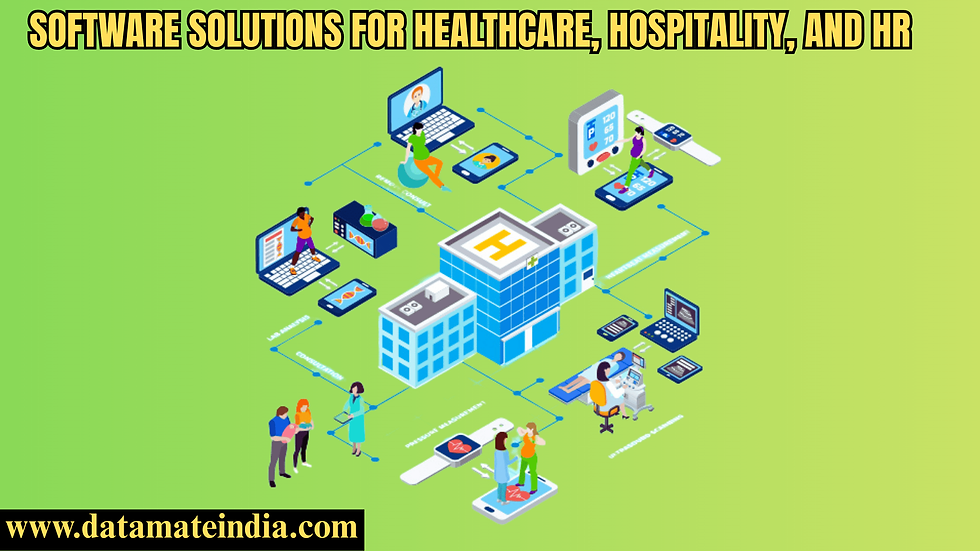Key Benefits of Implementing a Hospital Management System in Mid-Size Hospitals
- Sep 30, 2025
- 3 min read

Mid-size hospitals often find themselves at a crossroads when it comes to managing growth and maintaining high-quality patient care. They handle a large enough patient volume to require organized systems, yet they may not have the same resources as larger healthcare institutions. This is where adopting a Hospital management system can make a dramatic difference. By bridging efficiency gaps and automating daily processes, mid-size hospitals can improve care delivery, save costs, and stay competitive in a demanding healthcare environment.
Introducing a Hospital management system is more than just adopting new technology—it’s a transformation of how a hospital operates. With everything from patient records to billing consolidated in one place, administrators and medical staff gain the tools they need to provide seamless service. Let’s take a closer look at the key benefits that mid-size hospitals can achieve through implementation.
Streamlined Patient Information Management
In mid-size hospitals, keeping track of patient histories, diagnostic results, and treatment plans can be a challenge. A hospital management system ensures all data is securely stored and easily accessible. Doctors no longer need to sift through paper files or wait for records from other departments. With instant access, they can make faster and more informed decisions, ultimately improving patient outcomes.
Efficient Appointment Scheduling
For hospitals that see hundreds of patients daily, managing appointments can quickly become overwhelming. A hospital management system simplifies scheduling by providing automated booking, reminders, and cancellations. Patients experience reduced waiting times, while staff can manage workflows more effectively. This creates a smoother experience for both patients and healthcare providers.
Enhanced Communication Between Departments
Mid-size hospitals typically have multiple departments—radiology, pharmacy, pathology, and more—that need to coordinate patient care. A hospital management system allows information to flow seamlessly across these departments. For example, test results ordered by a doctor in one department can be viewed immediately by another, reducing delays and preventing miscommunication.
Reduced Errors and Improved Accuracy
Manual systems are prone to human error, which can result in billing mistakes, medication mishaps, or lost records. By digitalizing these processes, hospitals significantly cut down on errors. The system ensures accuracy in data entry, billing, and prescriptions, which is vital for patient safety and hospital reputation.
Improved Resource Allocation
Mid-size hospitals often work with limited budgets and staff. A hospital management system helps administrators track usage of equipment, beds, and medical supplies in real time. This ensures resources are optimally allocated and reduces waste. For instance, knowing bed availability at any given time allows hospitals to plan admissions more efficiently.
Financial Transparency and Billing
One of the standout features of these systems is accurate billing. Patients receive clear, itemized bills, and hospitals minimize revenue loss due to mistakes or missed charges. Integration with insurance claims further simplifies financial workflows, ensuring that mid-size hospitals maintain healthy cash flow and avoid unnecessary disputes.
Better Patient Experience
In today’s competitive healthcare industry, patient satisfaction is critical. A hospital management system contributes by offering patients easy access to appointments, reminders, and their own medical records. When patients see efficiency and transparency in their care, they develop greater trust in the hospital, which encourages long-term loyalty.
Data Security and Compliance
With increasing concerns around patient data privacy, hospitals must ensure compliance with healthcare regulations. A hospital management system provides secure storage, access control, and audit trails to safeguard sensitive information. This not only protects patients but also shields hospitals from potential legal or regulatory issues.
Staff Productivity and Morale
Hospital staff often find themselves buried in administrative tasks. By automating these responsibilities, the system frees up time for staff to focus on delivering care. Doctors can concentrate on treating patients, while administrative teams can focus on improving hospital services rather than handling repetitive paperwork. The boost in productivity also leads to higher staff morale.
Scalability for Growth
Mid-size hospitals are often in a growth phase, expanding services or adding new facilities. A hospital management system is highly scalable, allowing hospitals to integrate new departments, services, and patient volumes without disruption. This ensures smooth growth while maintaining high standards of care.
Analytics for Smarter Decisions
Beyond managing day-to-day operations, a hospital management system provides valuable data insights. Administrators can track patient trends, monitor staff performance, and evaluate resource utilization. These analytics empower hospitals to make strategic decisions that support both operational efficiency and improved patient outcomes.
Conclusion
For mid-size hospitals, implementing a hospital management system is not just a matter of convenience—it’s a strategic move that impacts every area of operation. From streamlining patient records to enhancing financial management and improving staff productivity, the benefits are extensive. Most importantly, these systems allow hospitals to focus on what matters most: delivering safe, efficient, and patient-centered care.
As healthcare demands grow, mid-size hospitals cannot afford to rely on outdated manual systems. By embracing a hospital management system, they ensure long-term success, improved patient satisfaction, and a stronger reputation in the competitive healthcare industry.



Comments